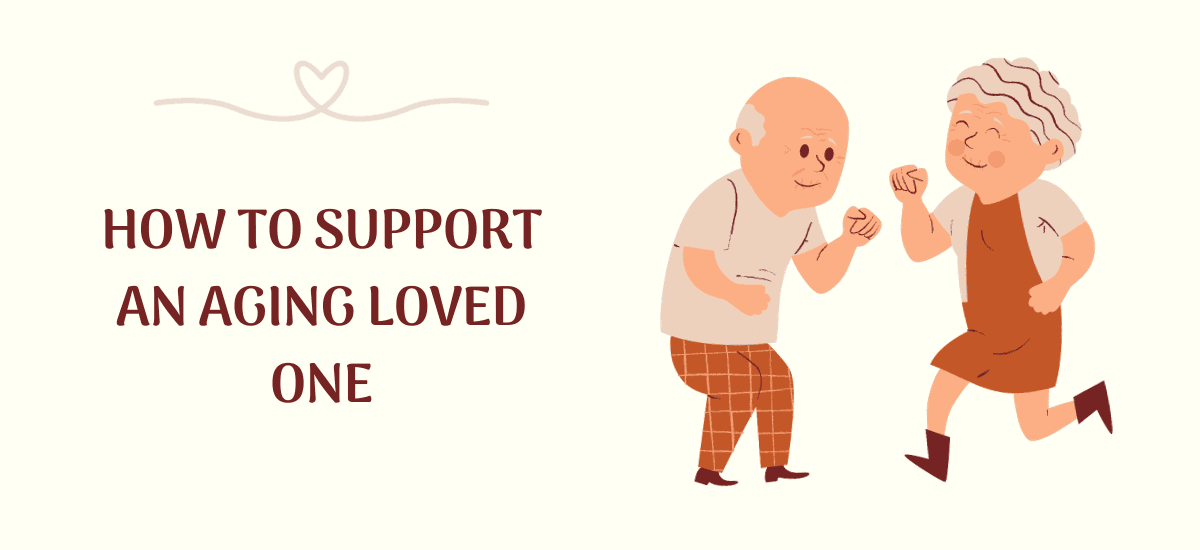Seniors And Mental Health: How To Support An Aging Loved One

Aging is related to changes in biological, physiological, environmental, psychological, behavioral, and social affairs. We mostly have heard stories about all aspects of old age, and less about how psychological change also takes place.
Research from 2018 on the aging process estimated that one in four older adults experiences some type of mental health disorder, and due to population aging, the total number of adults in need of mental health support is expected to double by 2030.
Many factors add to the vulnerability of developing mental health issues in seniors. They are likely to be external (relationship with family members, day-to-day functioning, social abilities where they are in direct touch with their surroundings) but the internal world also plays a key role. For someone who has a history of mental health issues (no matter the severity), aging can really make things hard to deal with. Studies also like to shed light up on the fact that a normal (life) process of aging can also contribute to increased issues.
Senior individuals face considerable changes in their physical and cognitive abilities along with daily routines due to health conditions. This can lead to loneliness and isolation, both of which can contribute to mental health conditions.
Another research (PAHO & WHO) stated, “Mental health problems are common among seniors and may include isolation, affective and anxiety disorders, dementia, and psychosis, among others. Many seniors also suffer from sleep and behavioral disorders, cognitive deterioration or confusion states as a result of physical disorders or surgical interventions.”
It is important to understand those old people in our family and even around us are to be treated with care. It makes it easy to think of ourselves with gray hair.
It is researched that seniors’ welfare comes from supportive social connections and secure personal relationships but be in distress from disrupted personal ties and loneliness.
So Here’s What To Look For As Common Warning Signs-
- Noticeable, persistent changes in mood
- Anger, aggressiveness, or restlessness
- A lack of positive emotion, even with activities a loved one usually enjoys
- Difficulty sleeping or sleeping too much
- Changes in appetite
- Frequent headaches, digestive issues, or chronic pain
- Reliance on alcohol or drugs
- Suicidal thoughts
- Engaging in high-risk activities
And Here’s How You Can Support Them-
1. Keep medical records in a folder and make copies for easy accessibility
2. Sort medications and keep a tally
3. Take notes when new side effects appear
4. Make a shared calendar
5. Check in frequently and pay attention to moods
6. Expand their social network
7. Find common interests and engage in activities
8. Engage in body movement (go for walks, exercise together, etc)
Common Therapy Types For Seniors
- Supportive Therapy-This form of treatment focuses on encouraging self-esteem and strengthening a person’s self-reliance. The target is to improve well-being by helping seniors renew their sense of confidence.
- Cognitive Behavioral Therapy (CBT)-Behaviors that result from depression, such as self-isolation, irritability, and appetite fluctuations; are often reinforced by unwanted, repetitive thoughts. CBT focuses on identifying and changing unwanted thoughts in order to alter the corresponding behaviors to improve the quality of life.
- Sleep and Relaxation Coaching-Poor sleeping habits can affect overall health and exacerbate depression and anxiety. This form of therapy helps to ease negative thoughts through relaxation, exercise, and sufficient rest.
- Pain Management Therapy-Many people who suffer from chronic pain that arises from aging can benefit from non-pharmaceutical treatments.
- Problem Solving Therapy-This type of therapy focuses on navigating stressful and difficult situations from a personal standpoint. For older adults dealing with sudden life changes, problem-solving therapy may be a way to learn coping techniques suited to their specific circumstances.
This is by no means the only outlook of approaches to mental health treatment.
Whatever emotions or circumstances your old member of the family is dealing with, be aware that there are a great variety of therapies with the potential to improve their day-to-day moods and quality of life.
Related Articles

Letting Go With Grace: Emotional Tools for Closure
Letting go is never easy. Whether we are parting ways with a loved one, ending a relationship, leaving a job, or saying goodbye to a cherished chapter of life, the emotional weight can feel overwhelming. Yet, closure is essential for our emotional well-being. Without it, we carry unresolved grief, anger, regret, or longing that can seep into new relationships and experiences, holding us back from healing and growth.

Breakup Blues: How to Cope and Rebuild Your Self-Worth
A breakup often feels like a silent earthquake—unseen by others but devastating within. The pain doesn’t just come from the loss of a relationship, but from the crumbling of the life, identity, and future you built with another person. You may find yourself questioning your worth, doubting your value, and feeling isolated even when surrounded by people. In Indian society, where emotional expression is often discouraged and breakups can be stigmatized, this pain may feel even more overwhelming. But the truth is—while breakups may shake you, they do not define you. You are not broken; you are in a process of emotional reformation. And with the right tools, guidance, and support system, you can rebuild not just your self-worth but also your entire life narrative.

Healing After Heartbreak: A Mental Health Perspective
Heartbreak doesn't just break your heart—it can shatter your sense of identity, peace, and purpose. Whether the end was expected or abrupt, mutual or one-sided, short-lived or long-term, the aftermath often leaves people emotionally disoriented. In Indian culture, where societal expectations and family involvement in romantic relationships are prevalent, the pain is not just personal—it is public. Yet, very few are taught how to heal from emotional loss in a healthy, sustainable way.

Boundaries in Love: Saying ‘No’ Without Guilt
Love, in its truest form, should be a safe space—a space where individuality is not only respected but celebrated. Yet, in many relationships, especially in the Indian cultural context, love is often misunderstood as constant availability, complete sacrifice, and putting the other person first, always. As noble as this may sound, this version of love often leads to emotional exhaustion, suppressed resentment, and the erosion of one’s identity.

How Depression Can Affect Your Relationship—And What You Can Do
Depression is not just an internal struggle—it ripples outward, affecting relationships, routines, and the emotional fabric that holds people together. When someone is dealing with depression, it's not only their world that becomes dim—it can cast a shadow over their most intimate connections too. In a country like India, where open conversations about mental health are still rare and love is often equated with endurance, depression within a relationship can become invisible, misunderstood, or misjudged.

When One Partner Struggles: Supporting Mental Health in Relationships
Relationships are a beautiful blend of shared experiences, emotional growth, and mutual care. But they also come with challenges—especially when one partner is struggling with their mental health. In a society like India, where mental health is still heavily stigmatized, couples often find themselves ill-equipped to handle psychological distress in their relationship.
